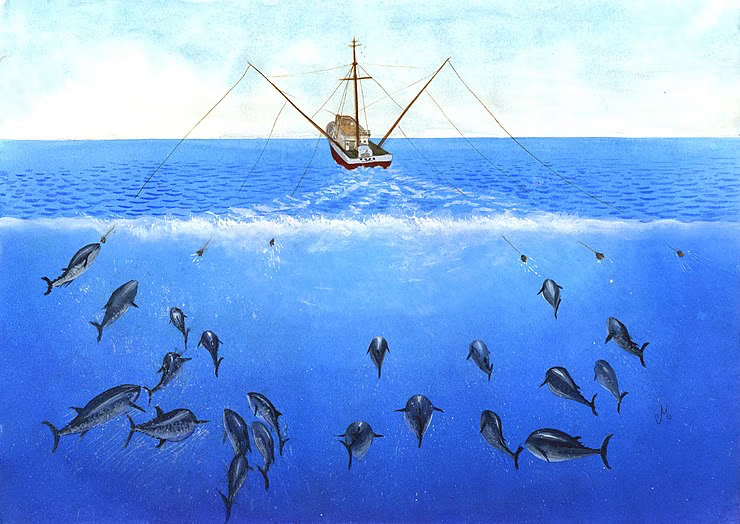Trolling meaning
A troll deliberately makes offensive or provocative comments on the internet, often to get an emotional reaction from others.
It's important to note that not all internet users who make nasty comments are trolls, as sometimes people simply have poor judgment or don't fully understand the impact of their words. However, trolls enjoy causing trouble and don't typically censor themselves.
Troll culture came about in the early days of the internet. Read more on internet's rich history here.
The term 'troll' refers to a fishing technique in which a lure is dragged through the water to catch fish. This practice was then likened to internet trolls baiting their victims online. Over time, the term 'troll' evolved from a verb to a noun and was associated with the mythical creatures known as trolls in Scandinavian folklore. In these stories, trolls are often depicted as monstrous creatures living in caves or hills, typically seen as ugly and malformed. While not all internet trolls fit this description, some engage in similarly destructive behaviour.

Internet Trolls psychology
Not all individuals who engage in trolling behaviour are the same. Some individuals who are highly skilled in the art of trolling are genuinely upset and competent individuals who view trolling as a way to express their opinions truthfully.
These individuals may feel disenfranchised due to the current state of the world. However, they adhere to a moral standard that values truth over tact. They are unafraid to post their opinions, and their statements are often difficult to refute, even if the delivery is crude. These highly skilled trolls may have experienced significant trauma that has given them unique insights into the human condition. They channel their negative emotions into their trolling to upgrade their lives and impart wisdom to others. These trolls deeply understand the harsh realities of life, which they share through their trolling.
You'll learn more on these trolls in this CBC article about: Trolls are spreading conspiracy theories
On the other hand, some trolls lack any actual competencies in life and are entitled individuals with a sense of superiority. These individuals often mimic skilled trolls but without any genuine talent. They spend their time trolling others on social media platforms such as Discord and Twitter. Read more about the the negative effects of social media. These individuals lack any sense of morality and only operate on their emotions.
This breed of trolls has no moral code of conduct and could insult a physically disabled or homeless person of their condition. They cannot introspect and only care about their own egotistical short-term pleasures. These individuals are a product of modern society's ugliness and can only exist in such an environment. It's essential to recognize the difference between high-quality trolls and these low-quality trolls.

How to respond to trolls on social media
Dealing with trolls can be a challenging and frustrating experience, but it's important to remain respectful and professional in all interactions. Responding with aggression or hate only fuels their negative behaviour and can make the situation worse. One effective strategy is to stay calm and not take their words personally.
Remember that trolls are often seeking attention and trying to provoke a reaction. Ignoring their comments or responding relaxed and rationally can help defuse the situation. You must avoid stooping to their level if you engage with a troll. Rather than resorting to insults or personal attacks, address their arguments directly and respectfully. Focus on the facts and avoid making assumptions or generalizations about the troll or their motivations.
In some cases, reporting the troll to the platform or community where the interaction occurs may be appropriate. Most online communities have rules and guidelines that prohibit hate speech, harassment, and other forms of abusive behaviour. Reporting the troll can help prevent them from continuing to spread negativity and harm to others. In summary, dealing with trolls requires patience, professionalism, and a commitment to treating others with respect.
By staying calm, avoiding personal attacks, and following community guidelines, you can help prevent the spread of hate and negativity online.

Characteristics of internet trolls
Identifying different types of trolls requires different strategies. For instance, some trolls may take offence at anything you say, while others may struggle to comprehend complex ideas and need further explanation. Using advanced vocabulary might be ineffective with some trolls, who may try to misinterpret your words to fit their agenda.
During group conversations with trolls, they comment without understanding the topic. It's essential to remember that everyone has different knowledge and expertise in other areas. Instead of belittling them for not understanding, offering more context or simplifying your language to aid their understanding can be helpful.
Intelligence can sometimes catch trolls off guard, but it's unfair to generalize and assume that all trolls engage in mindless activities like watching television, porn, or video games. Anyone can engage in such activities without necessarily being a troll, and it's essential to approach each individual with respect and understanding rather than making assumptions based on stereotypes or generalizations.

Positive effects of trolling
Trolling can have some potential benefits when used appropriately and with specific boundaries. One example is that through the humorous and satirical elements of trolling, individuals can become more open to new ideas. This can help convey a message more effectively, reaching people deeper than logical arguments.
Furthermore, trolling can help develop one's reasoning on a particular subject. By playing the devil's advocate, trolls can present opinions that may go against the grain, leading to a more nuanced and well-rounded discussion. Lastly, trolling can help build resilience and a stronger character. When faced with insults from trolls, individuals can let it affect them negatively or use it as an opportunity to learn and grow. Exposing oneself to trolling can make one less sensitive and better equipped to handle future encounters.
Conclusion
When faced with a troll, it can be tempting to respond unkindly, but it's important to remember to remain civil and not stoop to their level. While trolling can convey new ideas and offer alternative perspectives, it can also contribute to online harassment and negative behaviour.
Therefore, it's crucial to use discretion and be mindful of the potential impact of our online actions and avoid engaging in hateful or inflammatory language that could harm others. Instead, we should strive to cultivate a positive and constructive online community that encourages dialogue and mutual respect even in the face of disagreement.

